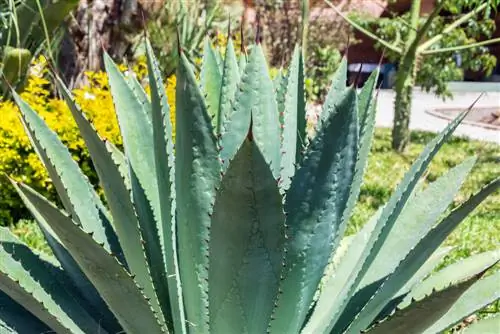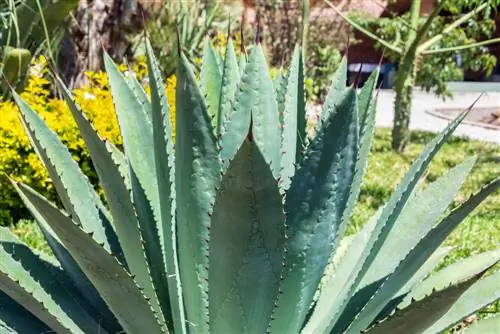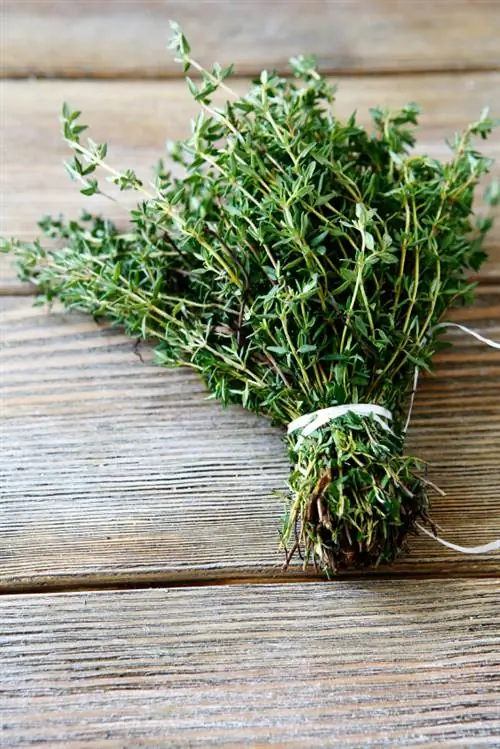- Author admin [email protected].
- Public 2023-12-16 16:46.
- Last modified 2025-01-23 11:22.
Agaves are fascinating plants that are cultivated in this country primarily for ornamental purposes as house and garden plants. However, there is uncertainty regarding their possible poisonous or healing effects: Are agaves actually medicinal plants?

What healing properties does agave have?
Agave can help wound healing when used externally due to its anti-inflammatory and antibacterial ingredients, but at the same time it is slightly toxic and can cause skin and mucous membrane irritation. The application is unsafe and not recommended.
Is agave a medicinal plant?
In fact, agaves have been specifically cultivated by the natives of South America for around 9,000 years. The desert plants can be used in a variety of ways:
- Textiles and ropes are made from the leaf fibers
- Leaves of large agaves were also used to build huts, for example to cover the roofs
- from agave juice (alcoholic) drinks
- and the sweetener agave syrup
- Leaves and flowers of some types of agave were eaten cooked
The plants were also used in traditional natural medicine, for example as a dressing or dressing material for wounds or wound extract. This is especially true for the species Agave americana.
Does agave have an anti-inflammatory effect?
The leaves of Agave americana contain steroidal saponins, isoflavones and coumarins, which, according to a few scientific studies, actually contribute to wound healing due to their antioxidant and antibacterial activities. The plant also contains genins, which reduce the inflammatory process. However, they are always used externally, and agaves are not suitable for sensitive or allergic people due to their ingredients, which also irritate the skin and mucous membranes. There are also uncertainties regarding the dosage, especially since scientific research in this area is not yet very advanced.
Is agave poisonous?
Agaves are considered slightly poisonous, although the saponins and the oxalate crystals they also contain can cause unpleasant symptoms. When used internally, the mucous membranes can swell and block the airways - this in turn would result in breathing difficulties. But external skin and mucous membrane irritations, including dermatitis, are not uncommon. Therefore, you should refrain from using agave as a possible medicinal plant, especially since the exact dosage for plants is extremely uncertain. After all, you cannot know for sure which ingredients are actually contained and in what quantities.
Is agave juice he althy?
Agave juice or agave syrup can now be bought in almost every supermarket. The thick syrup is marketed as a he althy alternative to sugar and honey, but this assumption is incorrect. Agave syrup has no he alth benefits for these reasons:
- 1, 5 times sweeter than regular sugar
- Valuable ingredients such as vitamins are destroyed during the manufacturing process
- Minerals only contained in small quantities
- Inulin can also be obtained from other, less sweet sources (e.g. leeks, onions, garlic, bananas)
In addition, agave syrup is also questionable for ecological reasons: the plants are grown in huge monocultures, for which the rainforest is cut down.
Tip
Risk of confusion with Aloe Vera
Due to their very similar appearance, agaves are often confused with aloe vera. The latter are often used for skin care or wound care, such as burns. In contrast to the fibrous agave, the leaves of aloe vera are thicker and filled with a gel-like interior.






